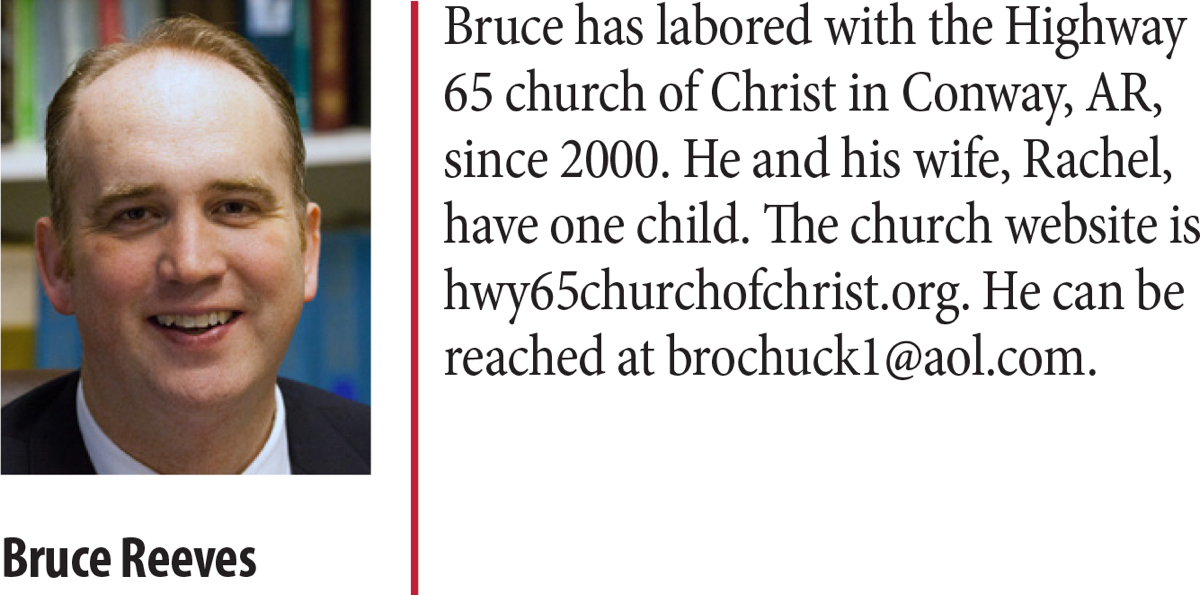By Bruce Reeves
Synopsis: In attempting to defend the final premise of Calvin’s T.U.L.I.P, i.e., the “Perseverance of the Saints,” proponents of Reformed Theology not only twist the Scriptures, but also rob their followers of any real assurance of salvation.
Discerning the “real issues” in any controversial discussion is often easier said than done. It is important that we fairly and accurately represent the views of those with whom we differ. This is especially true when we are addressing and interacting with advocates of Calvinistic Theology. While the Bible presents the assurance of our salvation, it is an assurance conditioned on a faithful walk with the Lord (1 John 5:11-13; Phil. 1:21-23; Acts 8:35-39; 2 Cor. 5:1-4, 7). Ironically, as we progress, we see that assurance of salvation is not something well-informed Calvinists can consistently claim.
The issue is not:
God’s power to save the believer
God’s faithfulness to His promises
God’s love for His children
The security of the believer
Flawless performance or being saved by grace
Rather, the issue is:
Can a child of God choose to leave Christ?
Can a Christian cast away the Lord’s promises?
Will God disinherit His unfaithful children?
Can a believer become an unbeliever?
Are there conditions connected with walking by faith?
There are some truths that are not at issue in this discussion:
Those who refuse to obey the gospel will be lost (John 8:24).
The faithful child of God is secure in Christ (John 4:13-14; 6:35-40; 10:25-30; Rom. 8:28-39; 2 Tim. 1:12; 1 Pet. 1:5; 1 John 5:11-13).
We are saved by grace through faith (Eph. 2:8-9).
While we should accept all passages which assure devoted disciples of salvation, none of these verses teach the impossibility of apostasy.
If one tenet of Reformed Theology falls, all logically fall. The Calvinistic system is tightly constructed, and its central teachings are interdependent. It is important to observe the circular reasoning of Calvinism in its unbiblical presentation of God’s sovereignty, human free will, the atonement, and salvation.
The perseverance of the saints is described in various ways: “preservation of the saints,” “security of the believer,” “impossibility of apostasy,” or “once saved, always saved.” Soft Calvinism is quite inconsistent and thus open to exposure by non-Calvinists and Calvinists alike. Yet Classic Calvinists must defend every point of their system, or it cannot logically survive.
Calvinists who subscribe to what is called “Lordship Salvation” argue that those who depart from God were lost from the very beginning. Yet, throughout their lifetimes, such individuals are told they were saved. This teaching may appear to offer assurance, but it doesn’t. Since we do not know where we will be (spiritually speaking) in the future, this teaching would demand that we live without the assurance of salvation. Some will argue, “I know I’m saved because I feel I’m saved” or “I know I’m saved because I bear fruit.” Yet, informed Calvinists admit that the non-elect can have feelings of assurance and still be lost. It is interesting that some who subscribe to this teaching hurl accusations about insecurity toward those who reject Reformed Theology when they have no real assurance themselves.
Peter explains that we have confidence in our salvation through the full surrender to God’s will: “If you do these things, you will never fall” (2 Pet. 1:10). However, this assurance does not promise the impossibility of falling if we leave the Lord (Gal. 5:4).
In contrast with the clear and consistent teaching of Scripture, Calvinism’s contorted view of salvation is “If you don’t have it, you can’t get it; if you get it, you can’t lose it; and if you lose it, you never had it.”
Charles Stanley has written the following in his book, The Eternal Security of the Believer:
Faith is simply the way we say yes to God’s free gift of eternal life. Faith and salvation are not one and the same any more than a gift and the hand that receives it are the same. Salvation or justification or adoption—whatever you wish to call it—stand independently of faith. Consequently, God does not require a constant attitude of faith to be saved—only an act of faith . . . One more illustration may be helpful. If I chose to have a tattoo put on my arm that would involve a one-time act on my part. Yet the tattoo would remain with me indefinitely. I don’t have to maintain an attitude of fondness for tattoos to ensure that the tattoo remains on my arm. In fact, I may change my mind the minute I receive it. But that does not change the fact that I have a tattoo on my arm. My request for the tattoo and the tattoo itself are two entirely different things. I received it by asking and paying for it. But asking for my money back and changing my attitude will not undo what is done. Forgiveness/salvation is applied at the moment of faith. It is not the same thing as faith. And its permanence is not contingent upon the permanence of one’s faith (Stanley, 80),
Sam Morris, a Baptist preacher, shared this view as well. The consequences are unbiblical and riveting.
We take the position that a Christian’s sins do not damn his soul. The way a Christian lives, what he says, his character, his conduct, or his attitude toward other people has nothing whatever to do with the salvation of his soul. All the prayers a man can pray, all the Bibles he may read, all the churches he may belong to, all the services he may attend, all the sermons he may practice, and all the debts he may pay, all the ordinances he may observe, all the laws he may keep, all the benevolent acts he may perform, will not make his soul one bit safer. And all the sins he may commit, from idolatry to murder, will not make his soul in any more danger (Morris, Do a Christian’s Sins Damn His Soul?).
Stephen Garrett, a declared Calvinist, in a debate in November 2009, was asked a question about homosexuality. The following was his response, “His second question is, ‘Is an elect and regenerated Christian saved while committing a homosexual act?’ Yes he is.” (Steven Garrett—Garrett / Gentry debate—6:54 of first affirmative speech Friday). In two debates with Mr. Garrett, on the subjects of Unconditional Election (2010) and the Impossibility of Apostasy (2012), we played this quote, and he continued to defend his statement.
Classic Calvinists will argue that salvation is conditioned on the gift of faith which is given irresistibly to those who are unconditionally elected and it is not of their own freewill:
This perseverance of the saints depends not upon their own free will, but upon the immutability of the decree of election, flowing from the free and unchangeable love of God the Father; upon the efficacy of the merit of the intercession of Jesus Christ, the abiding of the Spirit, and of the seed of God within them, and the nature of the covenant of grace: from all which ariseth also the certainty and infallibility thereof (The Westminster Confession of Faith, 17.1).
Wayne Gruden writes, “The perseverance of the saints means that all those who are truly born again will be kept by God’s power and will persevere as Christians until the end of their lives, and that only those who persevere until the end have been truly born again” (Gruden, 788). Yet, he goes on to write:
But here we see why the phrase eternal security can be quite misleading. In some evangelical churches, instead of teaching the full and balanced presentation of the perseverance of the saints, pastors have sometimes taught a watered-down version, which in effect tells people that all who have once made a profession of faith and have been baptized are “eternally secure.” The result is that some people who are not genuinely converted at all may “come forward” at the end of an evangelistic sermon to profess faith in Christ, and may be baptized shortly after that, but then they leave the fellowship of the church and live a life no different from the one they lived before they gained this “eternal security.” In this way, people are given false assurance and are being cruelly deceived into thinking they are going to heaven when in fact they are not (ibid., 806).
Again, the bottom line for Calvinism is that if you are lost, you cannot choose to be saved and if you are saved, you cannot choose to be lost.
The primary defense by Calvinists of the warning passages is that they are either addressing unsaved people who are deceived into thinking they are saved when they are not or merely speak of the loss of degrees of one’s heavenly reward. The first option is illogical—why would the Holy Spirit warn those who are not saved of falling from grace which they have never experienced in the first place? The notion of degrees of reward being lost assumes what is not taught in Scripture. Moreover, the logical conclusion of such a view argues for earning our heavenly reward through our works, the very thing Calvinists accuse non-Calvinists of believing.
Who is Paul warning? He addresses those who are “brethren” (1 Cor. 10:1) and have been “washed,” “sanctified,” and “justified” (1 Cor. 1:2; 6:11). Israel’s example references those who fell in the wilderness after having been delivered from Egyptian bondage because of their disobedience (Num. 14:26-38). The apostle affirms this Old Testament story is an example for us (1 Cor. 10:6). What should we learn? They fell, and so can we. If it were impossible to fall, what would be Paul’s point in warning saints with this admonition (1 Cor. 10:11)?
The correlation of this event to our spiritual lives is obvious. Just as Israel was delivered from Egypt and Pharaoh, we have been delivered from the world and from Satan. As they had Moses as their deliverer, we have Christ as ours. As they were partaking of the blessings of God’s grace, but fell into disobedience, so we too can fall in the wilderness of this world if we do not follow God’s guidance in our journey toward our heavenly Canaan. Paul presents the security of the believer by emphasizing God’s faithfulness to provide a way of escape in each temptation we encounter (1 Cor. 10:13). The apostle’s objective is clearly stated: “Therefore let him who thinks he stands, take heed that he does not fall” (1 Cor. 10:12).
The Galatians are described as those who had been rescued from the present evil age (Gal. 1:4). However, some of them were on the verge of deserting the Lord for a distorted gospel, which would rob them of their liberty in Christ and lead them back into the bondage of sin and the Law (Gal. 1:6-9; 2:4-5; 3:1-5). Paul exhorts believers to “keep standing firm” in the grace of God (Gal. 5:1). Why would he do so if there was no other alternative, or if it did not affect their salvation? If those who left the Lord had never been in a relationship with Him, why speak of them being “severed from Christ” and having “fallen from grace” (Gal. 5:4)? Those who were in jeopardy of being cut off from Christ were even told that they had in the past been “running well.” Then they were asked, “who hindered you from obeying the truth?” (Gal. 5:7). Previously, they had been obeying the truth, but in their present wayward state, they had “fallen from grace.” Christians are encouraged to bear the fruit of the Spirit, rather than the works of the flesh. Yet, Paul warns that if they abandoned the Spirit’s teaching for the works of the flesh, they would not inherit the kingdom of God (Gal. 5:19-21).
It is helpful to note Paul’s description of faith in Christ. He writes, “I have been crucified with Christ; and it is no longer I who live, but Christ lives in me; and the life which I now live in the flesh I live by the faith of the Son of God, who loved me and gave Himself up for me” (Gal. 2:20). Faith in Christ changes, renews, and restores us. It does not leave us in the enslavement and bondage of sin: “May it never be that I would boast, except in the cross of our Lord Jesus Christ, through which the world has been crucified to me, and I to the world” (Gal. 6:14). Once we have given our allegiance and loyalty to Jesus, the passions and desires of the flesh will be crucified (Gal. 5:24). Grace is not a license to sin; instead, it results in deliverance from sin and transformation into the image of God’s Son (Gal. 4:19). Our freedom in Christ is not freedom from “the law of Christ” (Gal. 6:2) or humble service to others (Gal. 5:6; 6:1-3), rather it is the freedom to give our heart to be like Jesus!
In our next column, we will delve into a study of the warnings and encouragement of Romans, Hebrews, and 2 Peter. We will see how those texts expose the false assurances of Calvinism and provide us with the promises of God’s abundant grace in the gospel of His Son!



